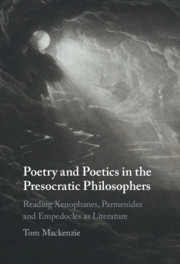 Poetry and Poetics in the Presocratic Philosophers
Poetry and Poetics in the Presocratic Philosophers Book contents
- Poetry and Poetics in the Presocratic Philosophers
- Poetry and Poetics in the Presocratic Philosophers
- Copyright page
- Dedication
- Contents
- Acknowledgements
- Abbreviations
- Note on Fragment Numbers
- Introduction
- Chapter 1 Xenophanes
- Chapter 2 Parmenides
- Chapter 3 Empedocles
- Conclusion
- Epilogue: The Legacy of Presocratic Poetics
- Bibliography
- Index
Epilogue: The Legacy of Presocratic Poetics
Published online by Cambridge University Press: 05 April 2021
- Poetry and Poetics in the Presocratic Philosophers
- Poetry and Poetics in the Presocratic Philosophers
- Copyright page
- Dedication
- Contents
- Acknowledgements
- Abbreviations
- Note on Fragment Numbers
- Introduction
- Chapter 1 Xenophanes
- Chapter 2 Parmenides
- Chapter 3 Empedocles
- Conclusion
- Epilogue: The Legacy of Presocratic Poetics
- Bibliography
- Index
Summary
This section substantiates the claim that Xenophanes, Parmenides and Empedocles played an instrumental role in the emergence of what may be termed the Classical conception of literature – that is, the view that a work of literature is a mortally crafted artefact that reflects a true state of affairs only symbolically or mimetically – by drawing attention to evidence for their influence on certain important developments in fifth- and fourth-century BCE poetics. These include (a) fifth-century practices of allegorical interpretation; (b) Gorgias’ statements that poetry is deceptive and is a kind of charm or drug; (c) Democritus’ physical explanations for poetic inspiration and composition; (d) Democritus and the sophists’ analytical approaches to language; and (e) the conceptions of mimesis presented by Plato.
- Type
- Chapter
- Information
- Poetry and Poetics in the Presocratic PhilosophersReading Xenophanes, Parmenides and Empedocles as Literature, pp. 183 - 206Publisher: Cambridge University PressPrint publication year: 2021
